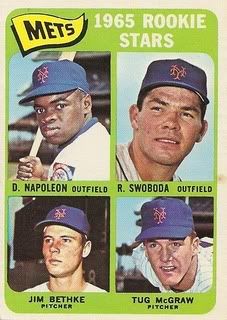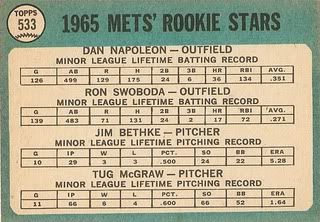
Fun facts about Dan Napoleon:
-Danny was born in Claysburg, PA, in the central region of the state. He attended Rider University in Lawrenceville, NJ before signing with the Mets in 1964.
-In his first pro season he set the Class A New York-Penn League on fire, batting .351 and slugging .639 with 36 home runs for Auburn.
-The talent-bereft Mets put Napoleon on their Opening Day roster in 1965. He delivered a pinch single off of Houston's Hal Woodeshick in his debut on April 14.
-Ten days later, the 23-year-old had what would prove to be the biggest hit of his career. Batting for Roy McMillan in the top of the ninth in San Francisco, he faced reliever Bob Shaw with the bases loaded, two out, and the Mets trailing by two runs. His bases-clearing triple was the game-winning blow.
-Spending most of his rookie year as a pinch hitter, Danny struggled. He had 14 hits in 97 at-bats (.144) with only 2 extra-base hits and 7 RBI.
-He was demoted to AAA Jacksonville for the 1966 season, returning to New York in September. He fared little better in his second try at the big leagues, totaling 7 hits in 33 tries (.212) with a pair of doubles, a lone walk, and 10 strikeouts.
-On April Fool's Day, 1967, Napoleon was traded to the Cardinals in a five-player deal. He didn't know it at the time, but he'd already played his last major league game.
-His abbreviated big league totals included a batting line of .162/.225/.200, 7 RBI, and 7 runs scored.
-Danny played in the St. Louis organization through the 1971 season, bowing out after a three-year stint in the AA Texas League with Arkansas.
-He passed away in Trenton, NJ at age 61 in 2003.
Fun facts about Ron Swoboda:
-A Baltimore, MD native, Ron attended Sparrows Point High School and the University of Maryland before the Mets inked him to a deal in 1963.
-Though he didn't have the eye-popping totals of Danny Napoleon, Swoboda had a strong minor league debut in his own right, batting .271 with 17 homers and 72 RBI with AA Williamsport and AAA Buffalo.
-He was a few months shy of his 20th birthday when he earned a spot in the Mets outfield in the spring of 1965. Ron started hot, going 10-for-30 (.333) in April with 4 home runs and 9 RBI.
-Though Rookie of the Year voters were scared away by his .228 season average, Ron did lead his club with 19 home runs in just 135 games. His power, when combined with a fair ability to take a walk (.291 OBP) and the lower leaguewide offensive standard, gave him a decent 102 OPS+. His consolation prize was a slot on the Topps All-Star Rookie team.
-His best all-around year was 1967, when he batted .281/.340/.419 with 13 homers and 53 RBI. He nearly paced Mets regulars in on-base percentage, finishing a couple hundredths of a point behind Tommy Davis.
-Swoboda was a standout performer for the Amazin' Mets in the 1969 World Series, as he delivered 6 hits in 15 at-bats (.400) and delivered the game-winning hit with an eighth-inning double off of the Orioles' Eddie Watt in the Game Five clincher. He also tormented his hometown team with a game-saving diving catch of a Brooks Robinson liner in the ninth inning of Game Four. It was a pretty heady play for a guy whose teammates dubbed him "Rocky" for his lack of grace in the outfield.
-Ron spent the second half of his career as a part-timer for the Expos and Yankees, retiring after the 1973 season.
-In parts of 9 big league campaigns, he hit .242/.324/.379 with 73 home runs and 344 RBI.
-Ron has had a lengthy career in sportscasting, working in New York City and then New Orleans, where he currently calls TV games for the Marlins' AAA Zephyrs club.
-A quote from Swoboda: "I'm kidded, occasionally, by folks who wonder: 'How long are you going to keep living off of one catch?'. My answer: 'How long have I got left?'."
Fun facts about Jim Bethke:
-Jim was born in Falls City, NE, and signed with the Mets as an amateur free agent in 1964.
-Despite some underwhelming minor league numbers and the fact that he was just 18, he was promoted to the majors at the start of the 1965 season. (Sensing a trend?) He was the youngest player in the league that year, and was 26 years younger than teammate Warren Spahn!
-He earned wins with scoreless relief appearances against the Astros on April 15 and the Braves on May 9. Despite walking four batters with only a single strikeout in a combined two and two-thirds innings in those games, he allowed just one hit.
-Bethke had a fine 2.86 ERA in 17 relief appearances in the first half of the year, but walked 12 men while striking out just 11. He spent July in the minors, and was not quite as lucky upon his return in August, finishing with a 2-0 record and a 4.28 ERA overall. He continued to walk more than he struck out, 22 and 19 standing as the final totals.
-Jim never made it back to the majors, plying his trade in the Mets and Royals farm systems up through the 1971 season. His pitching career ended at 24 years of age with minor league totals of 36-42 and a 3.36 ERA.
-He spent a short time with the Mets, but wore three different jersey numbers. According to the superb Mets by the Numbers, Bethke was given #41 in his season-opening stint with the club. When he returned in August, he took the #28 that had previously been worn by the since-demoted Carl Willey. Willey returned to New York in September and reclaimed his digits, and Jim switched to #36. So in less than a full season, one teenaged rookie wore the numbers later popularized by Tom Seaver, John Milner, and Jerry Koosman!
Fun facts about Tug McGraw:
-Born Frank Edwin McGraw in Martinez, CA, Tug signed with the Mets out of junior college in 1964. His older brother Hank, a catching prospect, leveraged the team into taking a flyer on the smaller pitcher.
-He debuted with the Mets in 1965 (of course!), posting a 2-7 record as a swingman with a 3.32 ERA and a single save.
-Tug's only two wins as a rookie came in consecutive starts. On August 22, he scattered 7 hits and 5 walks in a complete-game 4-2 win over the Cardinals. He then earned New York's first-ever victory over Sandy Koufax on August 26, holding the Dodgers to a pair of runs in 7.2 innings. Koufax had come in with a 13-0 record in 14 starts against the Mets (the Dodgers won the 14th game after he had departed).
-McGraw was battered in shorter big-league stints in 1966 and 1967, and spent portions of those seasons and all of 1968 in the minors. During this time, he learned a screwball from veteran pitcher Ralph Terry. It would later become his signature pitch.
-He was resurgent in 1969, when Mets manager Gil Hodges made him a full-time reliever. He finished the year 9-3 with a 2.24 ERA and 12 saves, teaming with righty Ron Taylor (13 saves) to give New York bullpen threats from both sides of the mound. Tug allowed only 2 runs in his last 38 innings, an 0.47 mark. He did not appear in the World Series, as the dominant Mets starters carried the team to victory.
-The lefty got even better with more experience, posting identical ERA marks of 1.70 in 1971 and 1972. He went 11-4 in the former season and saved 27 games in the latter, a team record broken in 1984 by Jesse Orosco. He made the first of two All-Star teams in 1972, earning the win and notching four strikeouts in two innings.
-Tug coined the phrase "You gotta believe" in 1973, which became the rallying cry for a Mets team that turned around a miserable season and eked out the National League pennant with a mere 82-79 record. McGraw himself was a part of both the nosedive and the resurgence: he followed up an 0-4 record, 6.17 ERA, and 1.73 WHIP in the first half with a 5-2 mark, a 1.64 ERA, and a 0.99 WHIP post-All-Star Game. His lack of activity in the 1969 World Series contrasted mightily to the 13.2 innings he tossed in 5 outings in the 1973 Series, which Oakland eked out in the full 7 games. Tug struck out 14 batters and allowed 4 earned runs, all of which came in a 6-inning slog in Game 2. He wound up with the win in that contest, as the Mets capitalized on a pair of Mike Andrews errors to put up four runs in the twelfth inning.
-Sent to the Phillies in a six-player swap prior to the 1975 season, McGraw was revitalized after a surgical procedure that removed accumulated deposits from his shoulder. He stayed in Philadelphia for a decade, posting a 3.10 ERA and saving 94 games total. He pitched in five postseasons in a six-year span, including the Phils' first-ever World Championship in 1980. He allowed a single run and struck out 10 Royals in 7.2 innings over 4 games that October, winning Game 5 and saving Game 1 and the Game 6 clincher.
-Tug hung up his spikes following the 1984 season, finishing his career with a 96-92 record, 180 saves, and a 3.14 ERA in parts of 19 seasons. He was chosen for the Mets Hall of Fame in 1993 and the Phillies Wall of Fame in 1999.
-One of his four children was Tim McGraw, the product of a fling he had while pitching in the minors in 1966. He denied paternity for several years, but the two eventually became close and Tug helped Tim launch a successful career as a country musician. Tug was diagnosed with an inoperable brain tumor in March 2003 and given three weeks to live. He hung on for nine months, passing away at age 59 on January 5, 2004.



most people don't know or realize this, but "Ya Gotta Believe!" was said as a joke. He was mocking a not-so-motivating pep talk from one of the Mets higher ups at the time. But, as these things often do, it stuck and it actually kinda worked, until games 6 and 7 of the series :/
ReplyDeleteoh, and I have been hiding under the bed, no one ever looks there...
Tug also created a comic strip called "Scroogie" that was nationally syndicated for a few years back in the 1970s.
ReplyDelete